2003
Best Travel Technology Product Awards
Analysis and Commentary
|
|
Here is some additional information and analysis on the
results of our 2003 Best Travel Technology Product Awards.
In addition to simply voting for the best in each
category, some interesting additional information and
interpretation can be gained from looking at the results in
more detail.
|
In February 2004, over 2000
Travel Insider readers voted for their favorite products from a
short list of items that had been reviewed during 2003.
The winners are detailed on
this page. Here,
below, is more information on how the winners were chosen.
Voter Sample Skewing
A problem with any type of
voluntary participation sampling/voting is that the people who
choose to participate may not be representative of the general
population within which they belong.
This problem is further
exacerbated when the sample is drawn from a small group of
people that are not necessarily representative of the general
population to start with.
This voting is no exception.
Because voters are readers of our newsletter, we know something
about their general demographics, based on a reader survey in
December 03.
Travel Insider readers are
strongly skewed to upper income and upper education, and rate
themselves as early adopters and gadget lovers.
They are older than typical
web users (average age of 54.2), comprising 63% men and 37%
women. They are very well educated (80% have at least college
education, and 41% have post graduate qualifications) and are
strongly skewed to upper income levels (47% reporting over $100k
in total family income and 27% reporting over $150k total
income). 91% of readers live in the US, and 71% are married.
44% of Travel Insider
readers describe themselves as ‘Gadget Lovers’ and 42% consider
they are early adopters of new technologies. 87% have purchased
products online three or more times in the last year, and 68%
have purchased online six or more times. 71% intend to buy a new
cell phone in the next year.
Travel Insider readers
travel a great deal. The average reader travels more than ten
times a year - five times on business within the US, twice
internationally, and three times on vacation.
Plainly, Travel Insider
readers know a great deal about technology and travel!
How we Analyzed and Interpreted
the Results
We correctly anticipated
that few people would vote for all products, because very few
people would have hands-on experience with all the products
offered.
So, how then to rank the
results? Which should be considered better - a product
with lots of positive votes, or a product with a higher
percentage of positive votes? Our general approach was to
look not so much at the simple number of votes cast, but rather
at the spread among those votes between high scores (3 or 4) and
low scores (1 or 2).
For this reason, results are
shown below in pie chart format, enabling you to quickly assess
whether a product received predominantly positive or negative or
neutral voting.
Here are several of the more
interesting results.
The battle between Bose Quiet
Comfort 2 and Plane Quiet
Although the Plane Quiet
headphones ended up winning, the Quiet Comfort 2 headphones from
Bose came a close second.
We say this not to detract
from Plane Quiet's win, but perhaps to add to it. Both
products had been reviewed in 2003 and both were candidates for
the award. We even conceded, in our Quiet Comfort review,
that they were probably slightly better at noise reducing, and
slightly better in terms of finish and presentation. But
we also observed that they cost $300, whereas the PQ's, with
only slightly less excellent performance, were one quarter the
price (Travel Insider readers get a 10% discount, making the PQ
price a true bargain at only $71.99).
In the first two charts, we
compare the spread of votes for the QC2 with the votes for the
PQ. It can be seen that the PQ has a stronger percentage
of people giving it the maximum rating of 4 (= 'very satisfied')
but it also has a slightly stronger percentage of people giving
it the minimum rating of 0 (= 'very unsatisfied').
Even so, clearly the PQ
product is more generally well regarded than the QC2 product.
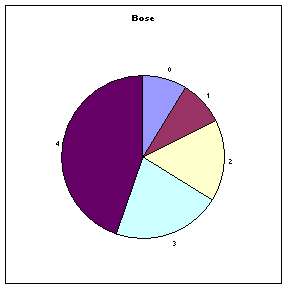
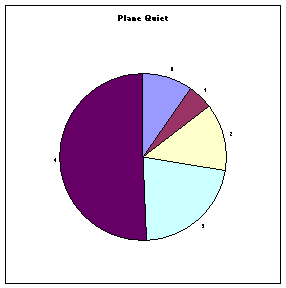
The Zero Voting
We feel that the 0 score was
misunderstood by some people, and individual voting analysis
revealed that a significant number of people who voted a zero
score also checked off the box indicating they knew nothing
about the product or had no opinion. Quite likely, these
people thought that zero meant 'have no opinion'.
Having considered the
implications of the mistaken 0 voting, here are two more charts,
showing the results of just 1 - 4 voting for the two products.
The lead of the PQ over the
QC2 is affirmed with this alternate analysis and so, both ways,
we're pleased to confirm the Plane Quiet as the winner.
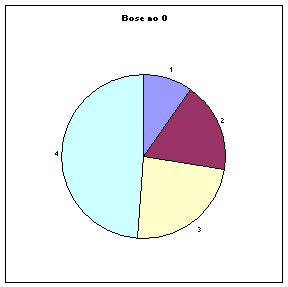
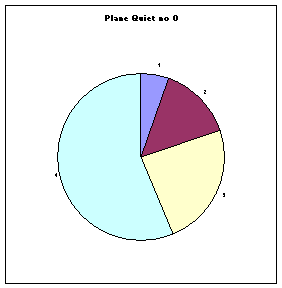
Most Favorite Item Voting
After discarding
invalid/inconsistent voting, and noting that not all ballots
included a choice of most favorite product, we ended up with
just over 1000 votes for the two 'most favorite' products.
In the first category -
technology - three products scored significantly above the
others. In the second category - other travel - the Search
Alert locks were clearly the high scorer.
However, note that these
results don't necessarily indicate which products readers
thought were best. It is as likely to indicate simply
which products readers were most familiar with.
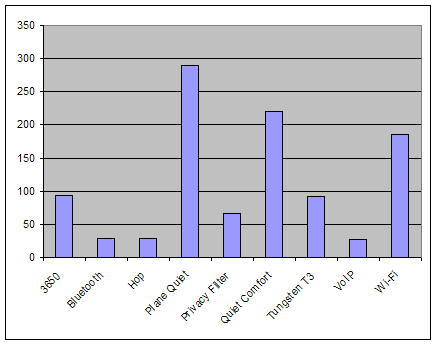
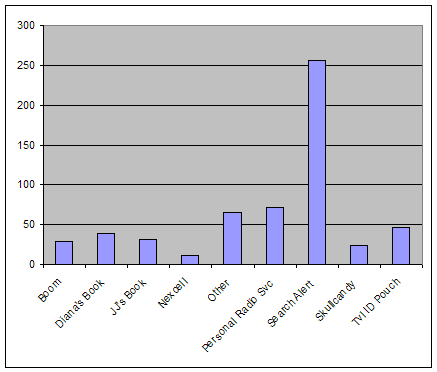
The
Love/Hate Relationship with High-Tech
The reader scoring of the
Nokia 3650 (discussed on the main
award page) is fascinating to see. A large and almost
identical number of votes for both the maximum and minimum
rating, and then almost identical numbers of medium ratings too.
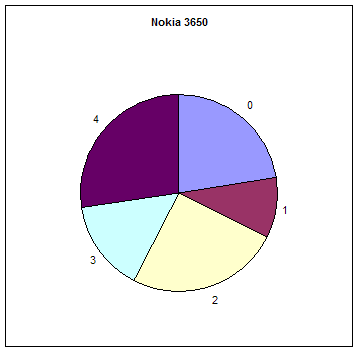
By way of comparison,
another state of the art device, the
Palm Tungsten T3, scored much more asymmetrically.
Although it too had a larger 0 score than Palm should feel
comfortable with (compare, for example, with the first two pie
charts for PQ and QC2), on balance readers were much more
strongly favorably inclined to this device.
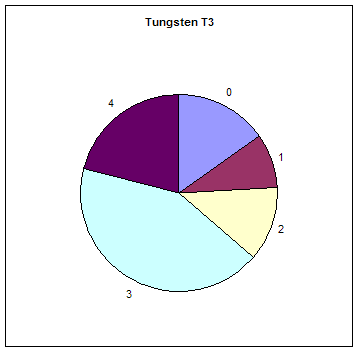
A new technology that is
just now starting to move into the mainstream is VoIP telephony.
As can be seen below, this too has a substantial percentage of
readers who do not yet feel comfortable with the service.
It is certainly true that
earlier implementations of VoIP gave poor audio quality, and
without a gateway into the regular phone network, were of
limited use. But the new services, such as
Packet 8 and
Vonage, have addressed these
shortcomings, and are rapidly becoming accepted as a viable and
sensible alternative to ordinary 'old fashioned' wired phones.
With over 3% of all cell
phone users (= 4.5 million people) now having abandoned their
traditional wired home phone, and with the growing impact of
VoIP service, the future of regular phone service would seem to
be increasingly constrained.
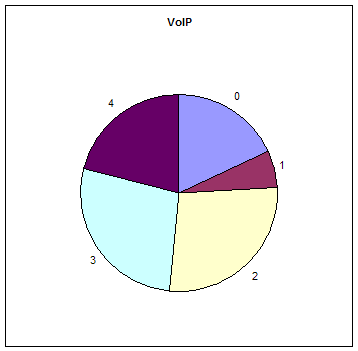
SearchAlert - Good and Bad
Although we awarded
SearchAlert the 'Best Travel Product' award, it is interesting
to see that a large percentage of people gave it a 0 score.
As well as the ever present
consideration that 0 scores are sometimes unreliable, we believe
that there is another factor that explains this surprisingly
strong 0 rating. In the first few months after SearchAlert
was released into the market, many travelers were suffering
problems with ignorant TSA workers choosing to cut off the
SearchAlert locks, rather than using the master keys they had
been supplied with to open and then relock the locks.
Some users even reported
that airline or TSA personnel would refuse to accept suitcases
locked with these locks.
Although the TSA did indeed
approve these locks, and claimed to have trained its staff in
the procedures for how to identify and then open the locks,
plainly this did not occur to nearly the extent it should have.
However, the generous
warranty offered by SearchAlert's manufacturer (if the TSA break
off a lock, CCL Security will replace it for free, even though
it absolutely isn't CCL's fault!) salved the pain caused by the
TSA's ignorant inefficiency. And with a vastly reduced
number of reported incidences of problems, it seems that the TSA
has also now completed training their staff.
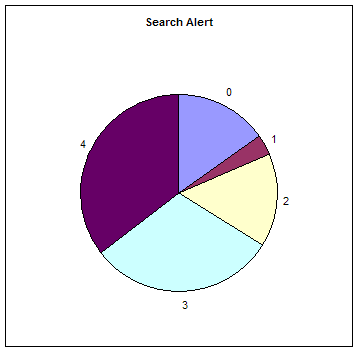
Summary
In addition to choosing the
best products, the reader voting patterns uncovered some
interesting issues.
We all look forward to
repeating the exercise in 2004, building on the results of the
2003 Awards.
Related Articles, etc
|
If so, please donate to keep the website free and fund the addition of more articles like this. Any help is most appreciated - simply click below to securely send a contribution through a credit card and Paypal.
|
Originally published
20 Feb 2004, last update
30 May 2021
You may freely reproduce or distribute this article for noncommercial purposes as long as you give credit to me as original writer.
|

